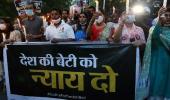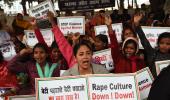The Delhi high court on Wednesday delivered a split verdict on the issue of criminalisation of marital rape on a batch of petitions challenging the exception in the law that exempts husbands from being prosecuted for non-consensual sexual intercourse with their wives.

However, both the judges --Justice Rajiv Shakdher and Justice C Hari Shankar--on the bench concurred with each other for granting a certificate of leave to appeal to the Supreme Court in the matter as it involves substantial questions of law which requires a decision from the top court.
While Justice Shakdher, who headed the division bench, favoured striking down the marital rape exception for being "unconstitutional" and said it would be "tragic if a married woman's call for justice is not heard even after 162 years" since the enactment of IPC, Justice Shankar said the exception under the rape law is not "unconstitutional and was based on an intelligible differentia".
The petitioners had challenged the constitutionality of the marital rape exception under Section 375 IPC (rape) on the ground that it discriminated against married women who are sexually assaulted by their husbands.
Under the exception given in Section 375 of the IPC, sexual intercourse or sexual acts by a man with his wife, the wife not being minor, is not rape.
The bench delivered a 393-page split verdict in the matter.
Justice Shakdher, in the 192 pages penned by him, regretted that he was not able to persuade Justice Shankar to his point of view and said “he, perhaps, hears a beat of a different drummer. I respect that.”
Justice Shakdher also said, "to the petitioners and their ilk I would say it may seem that you plough a lonely furrow today but it will change, if not now, someday. To the naysayers, I would say that every dissent adds flavour and acuteness to the debate at hand, which assists the next court, if nothing else, in arriving at a conclusion which is closer to justice and truth”.
He said exception 2 of 375 (Marital Rape Exception), Section 376B (sexual intercourse by husband upon his wife during separation) of IPC was violative of Articles 14 (Equality before law), 15 (prohibition of discrimination on grounds of religion, race, caste, sex or place of birth), 19(1) (A) (right to freedom of speech and expression) and 21 (right to life and personal liberty) of the Constitution and is struck down.
He also said this declaration would, however, operate from the date of the decision.
Justice Shankar, who gave dissenting views in 200 pages written by him, said the challenge to the vires of the second exception to Section 375 and Section 376B of the IPC and Section 198B of the Code of Criminal Procedure, as raised in these petitions, must fail.
He said it remained a matter of lasting regret that their differences, regarding the outcome of these proceedings, appear irreconcilable.
“Having had the opportunity of poring through the illuminating opinion of my noble and learned brother Rajiv Shakdher, Justice, I must state, at the outset, that I cede place to none in my estimation of the intellectual integrity of my brother; it remains a matter of lasting regret, therefore, that our differences, regarding the outcome of these proceedings, appear irreconcilable, that, however, remains one of the travails of being a judge. One cannot compromise on one's convictions even if it is to sail with the tide, howsoever compelling the tide maybe," he said.
Justice Shankar said "I have not been able to agree with my learned brother" and added that these provisions do not violate Articles 14, 19 (1) (A), and 21 of the Constitution.
He said the courts cannot substitute their subjective value judgement for the view of the democratically elected legislature and the exception is based on an intelligible differentia.
He said the challenge to the provisions by the petitioners cannot sustain.
Terming the split verdict as "disappointing", some women activists expressed hope that the Supreme Court will exercise "much more wisdom" in the matter, saying the current provisions are discriminatory against one category of rape victims.
Delhi Commission for Women Swati Maliwal said that marital rape is a reality and it is high time for an action against it.
"Don't know how many more years we will have to wait to change a British era law! Marital rape is a reality and it's high time we take the strongest action against it!" she tweeted.
Noting that the HC has "simply passed the buck" to the Supreme Court in the matter, All India Progressive Women's Association member Kavita Krishnan said: "The verdict by High Court is very disappointing and upsetting. The legal issue is very clear and it is discriminatory against one category of rape victims--wives. I hope that SC will show the courage and clarity needed for removing this shameful law."
The court's verdict came on PILs filed in 2015 and 2017 by NGOs RIT Foundation, All India Democratic Women's Association, a man and a woman seeking striking down of the exception granted to husbands under the Indian rape law.
In its 2017 affidavit, the Centre had opposed the pleas, saying that marital rape cannot be made a criminal offence as it could become a phenomenon that may destabilise the institution of marriage and an easy tool for harassing husbands.
However, the Centre told the court in January that it was "re-looking" at its earlier stand on the petitions as that was brought on record in the affidavit filed several years ago.
In February, the Centre had urged the court to grant more time to enable it to state its stand on the issue after a consultative process.
The request was however turned down by the bench on the ground that it was not possible to defer an ongoing matter endlessly.
While the petitioners had said that marital rape was the biggest form of sexual violence against women, the Delhi government had said this act was already covered as a "crime of cruelty" under IPC.
Insofar as the Centre is concerned, Tushar Mehta, learned Solicitor General stated before us in no uncertain terms that it does not wish to take a stand in the matter, the HC said and added in fact, affidavit(s) were filed to the effect that the Centre would like to engage in consultation before moving further in the matter.
On the other hand, while submissions were made at length by Ms Nandita Rao, who represented the GNCTD; on the last day, on instructions, she stated that she wished to withdraw the submissions which were made by her, in the course of the hearing, on behalf of GNCTD, it said.
Therefore, practically, the state made no case for or against the continuance of the impugned provisions on the statute, the HC added.
NGO, Men Welfare Trust, which is opposing the batch of petitions seeking criminalisation of marital rape, had argued that sexual intercourse between a husband and wife cannot be treated at par with that in non-marital relationships as the issue of consent cannot be divorced from the context of a marriage.
It had submitted that the Domestic Violence Act was specifically promulgated for recognising spouse sexual violence.











 © 2025
© 2025